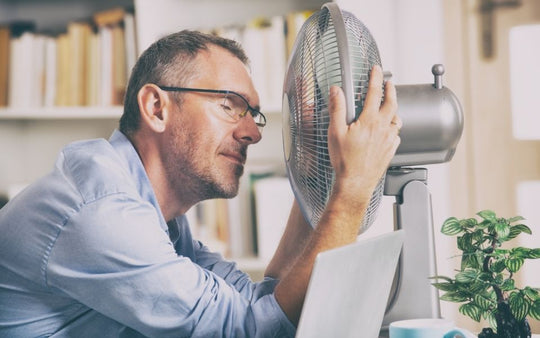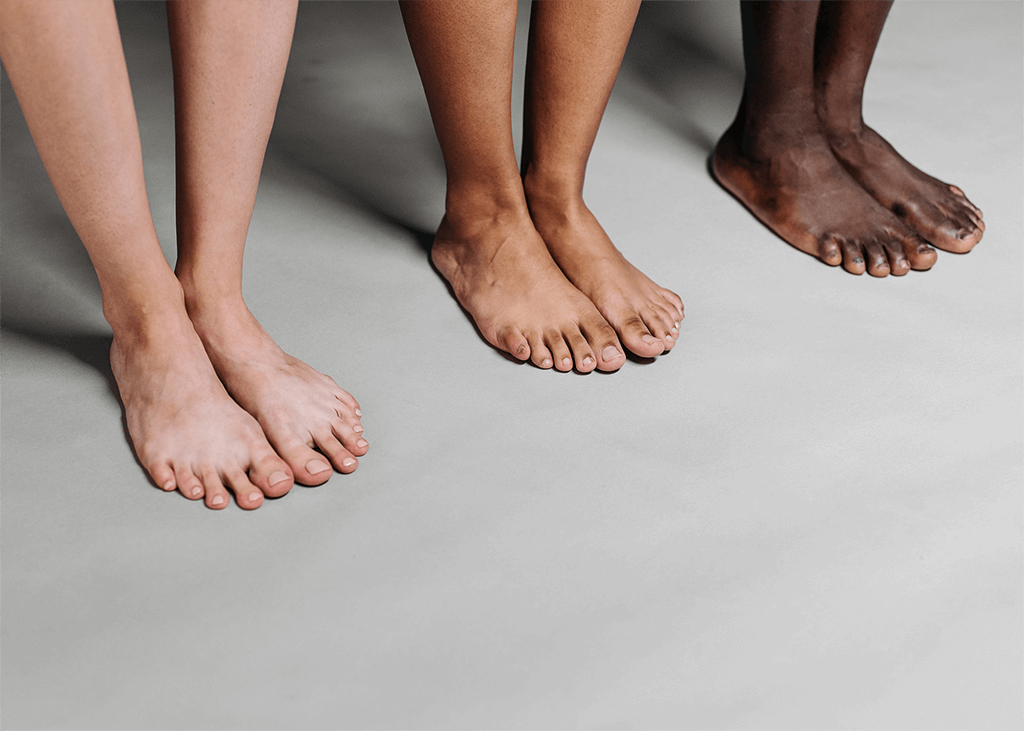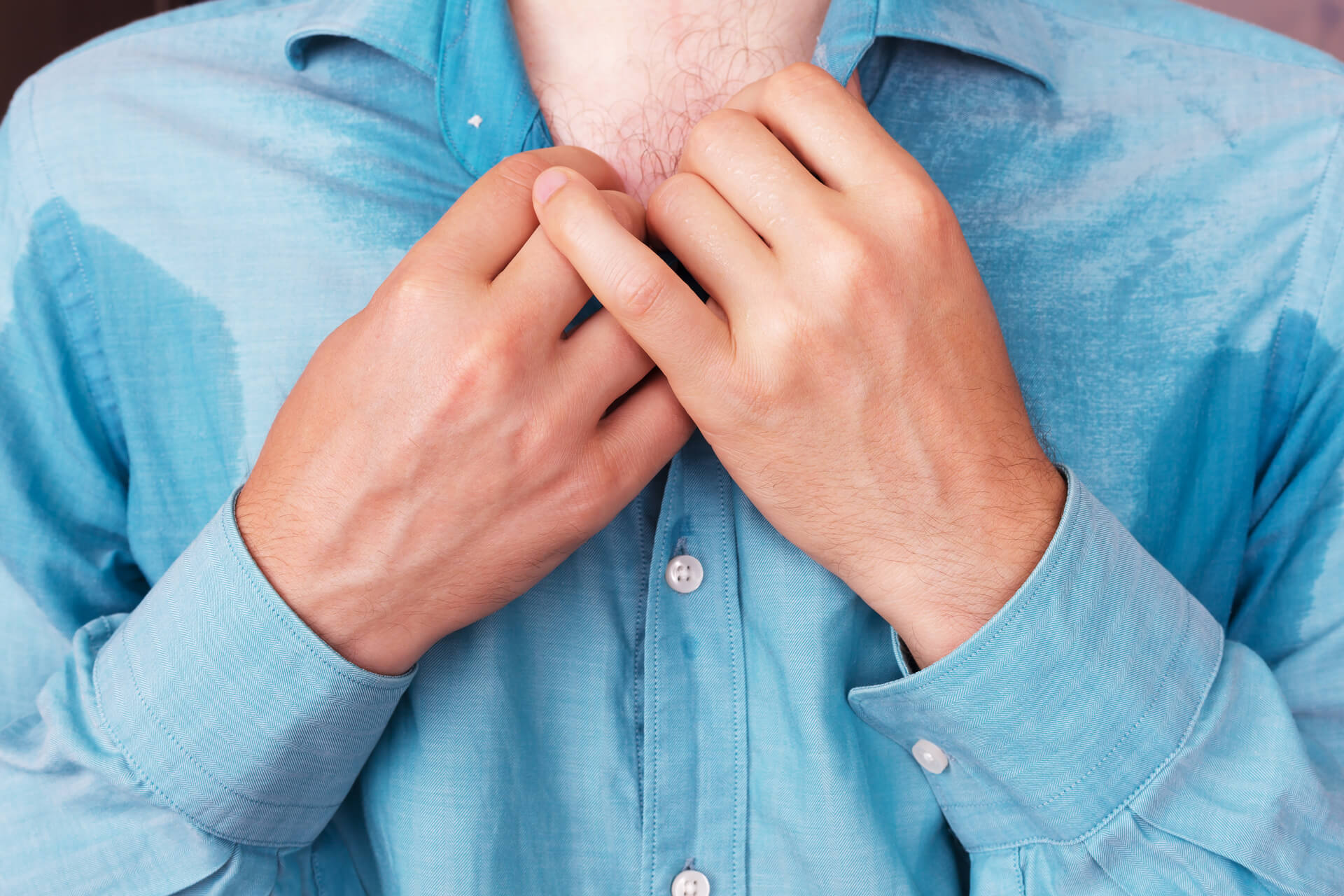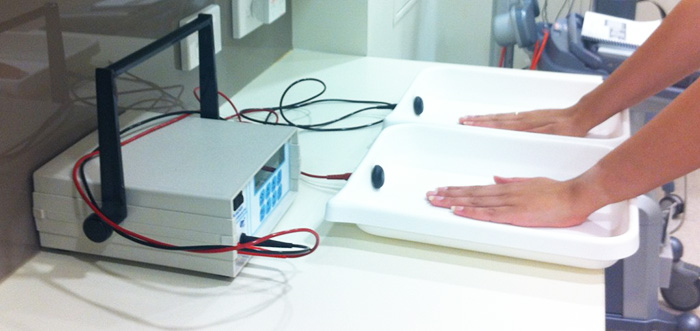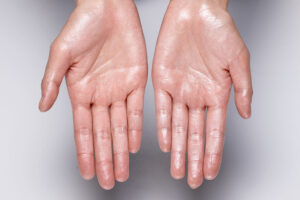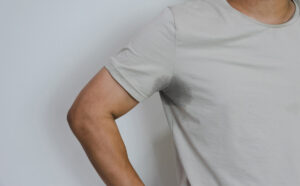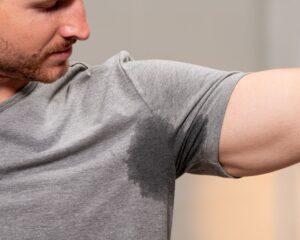In this article...
Imagine you’re meeting someone for the first time and your hands are sweaty. Doesn’t matter how often you wipe them on your clothing or with that wad of tissue in your pocket. They’re still sweaty. And your nerves are only making things worse.
If you’ve struggled with sweaty hands, you’re all too familiar with sweaty situations like:
- Sweaty handshakes that sabotage first impressions.
- Clammy hands that stop you from holding hands with that special someone.
- Constant hand perspiration that soaks keyboards, paperwork, and game controllers.
Is there a cure for sweaty hands? Not really. Extra sweat can be caused by a number of factors. And that means the “fix” is never one-size-fits-all.
However, there are common remedies and lifestyle changes that can reduce hand sweating and improve your situation.
The best way to figure out your sweat control protocol is to identify the cause.
Why Do My Hands Sweat So Much?
Some hand sweating is normal. Most people experience sweaty palms during stressful situations, anxious moments, high temperatures, or physical exertion. It’s not uncommon to get clammy hands during a tense movie, playing your favorite video game, climbing, or weightlifting.
These activities create higher stress levels that raise your body temperature. Your sweat glands expel the extra heat via sweat and evaporation. Unfortunately, your palms don’t get a pass on this necessary cooling process.
If your hands are always sweating or sweat excessively, it could be something more.
Common Causes of Sweaty Hands
- Anxiety and emotional stress
- Palmar hyperhidrosis
- Genetics
- Hormones
- Physical activity
- Hot environments
- Diet
- Underlying health conditions
- Prescription drugs and medications
We’ll talk more about these later. For now, let’s cut to the chase.
How do you stop sweaty hands?

12 Ways To Deal with Sweaty Hands
This is the list you’ve been waiting for. Here are several ways to prevent or reduce excessive hand sweating. We’ve arranged this list by most convenient remedies to least convenient treatments.
1. ANTIPERSPIRANT FOR HANDS

An antiperspirant is the easiest proven way to control sweating. Antiperspirants work by plugging and shrinking the pores connected to your sweat glands. As a result, you sweat less wherever you apply antiperspirant.
Will any antiperspirant work for hands? Antiperspirant sticks, roll-ons, and sprays are ideal for treating sweaty armpits, but lotions, creams, and gels are better for suited if you’re dealing with sweaty feet or hands.
Before diving into DIY concoctions or pricey and sometimes painful treatments, try a antiperspirant lotion designed for hands.
2. ALCOHOL-BASED HAND WIPES

If you don’t like the idea of using antiperspirant for your hands, try using alcohol-based hand wipes for a quick, temporary fix.
Alcohol is an astringent. When applied topically, it can help keep your hands temporarily dry with its pore-shrinking abilities. This useful trick might come in handy right before an important interview or social event.
But if your hands sweat excessively, you’ll need something more reliable like a hand antiperspirant.
3. ABSORB SWEAT WITH BODY POWDERS

Body powders and baby powders absorb moisture and sweat. So, every time you start to feel sweat on your hands, dust them with a bit of body powder.
Consider carrying a travel-size bottle with you or stash one at work to use throughout the day. When considering a body powder, always look for talc free powders.
Alternatively, you can use baking soda or cornstarch.
4. SWEAT ABSORBING TOWEL OR HANKY

A microfiber sweat absorbing towel can be a life saver in the right moments. You can hide a towel in your pocket for sweat emergencies.
Time to shake hands before or after an important interview? Just a quick wipe with your sweat hanky can remove a lot of the stress and sweat for important moments.
We recommend a small microfiber, sweat absorbing towel that can be discreetly stored in a pocket, purse or bag.
Microfiber dries fast and can absorb more sweat than a traditional handkerchief.
5. STAY HYDRATED

Eating or avoiding certain foods might be an effective treatment.1 Did you know that what you eat can impact your sweating? Certain foods will increase your sweating, while other foods can help you sweat less.
A healthy diet leads to balance and a healthier body. A poor diet leads to imbalance in the physical, emotional, and mental facets of your life. Imbalances can lead to chronic illness, weight gain, anxiety, and you guessed it– excessive sweating. Less bad stuff + more good stuff = a happier, healthier, and less-sweaty you.
Review your diet. You might be able to calm your sweaty hands with a few simple tweaks.
Start by avoiding caffeine, alcoholic beverages, and spicy, fatty, fried, and processed foods.
These foods can raise your body temperature and increase your heart rate. When your body temperature rises, you perspire more to expel the extra heat.
You’ll also want to replace the bad stuff with good food options like whole grains and nuts. Vitamins B and D can also be useful in promoting balance.
6. DIET & DETOX

Eating or avoiding certain foods might be an effective treatment.1 Did you know that what you eat can impact your sweating? Certain foods will increase your sweating, while other foods can help you sweat less.
A healthy diet leads to balance and a healthier body. A poor diet leads to imbalance in the physical, emotional, and mental facets of your life. Imbalances can lead to chronic illness, weight gain, anxiety, and you guessed it– excessive sweating. Less bad stuff + more good stuff = a happier, healthier, and less-sweaty you.
Review your diet. You might be able to calm your sweaty hands with a few simple tweaks.
Start by avoiding caffeine, alcoholic beverages, and spicy, fatty, fried, and processed foods.
These foods can raise your body temperature and increase your heart rate. When your body temperature rises, you perspire more to expel the extra heat.
You’ll also want to replace the bad stuff with good food options like whole grains and nuts. Vitamins B and D can also be useful in promoting balance.
Here are a few of our favorite vitamin-rich food sources:
- Kale – Loaded with vitamins A, C, K, and B6.
- Salmon – A great source of vitamin D and B vitamins.
- Blueberries – Rich in vitamin C and K.
- Avocado – High in vitamins E, K, C, and several B vitamins.
- Bell Peppers – Abundant in vitamins C, A, and B6.
- Eggs – Provide vitamins A, D, E, and B12.
You should also add fruits and vegetables that have high water content to your diet. They help keep your body hydrated. Some options include:
- Broccoli
- Cauliflower
- Watermelon
- Strawberries
- Grapefruit
- Apples
- Plums
- Oranges
- Lettuce
- Zucchini
- Radishes
- Celery
7. SAGE TEA SOAK

Sage is known as Mother Nature’s antiperspirant. For people who don’t like over-the-counter antiperspirants, this may be a good alternative remedy for sweaty hands.
Sage contains a natural astringent called tannic acid. Tannic acid can constrict and shrink your sweat ducts. This shrinking helps reduce sweat, similar to an antiperspirant.
How it works:
- Add 4-5 sage tea bags to a quart of boiling water.
- Let the tea steep until it’s cool enough to touch.
- Once cooled, soak your hands in the sage tea solution for 30 minutes.
Feeling Brave? Some “experts” claim that drinking sage tea can also reduce excessive sweat. Just make sure you don’t drink the same tea you used for your hands. 😬
A sage tea soak also works for sweaty feet.
8. ROSE WATER, WITCH HAZEL, LEMON JUICE...

Rose water, often used as a skin toner, can be purchased anywhere that makeup and skincare products are sold. It works by closing your skin pores, which reduces the amount of sweat reaching the skin’s surface.
Dip a cotton ball in the rose water then wipe it generously over your palms. Let your hands air dry.
Other natural astringents like witch hazel, lemon juice or apple cider vinegar can also be applied to your hands this same way. But if you use either of these techniques, you should rinse your hands completely once they’ve dried.
9. COCONUT OIL

After your daily shower, take a small lump of coconut oil and rub it between your palms until they’re fully coated. Coconut oil is a natural antiperspirant and it has several other skin-related benefits.
10. REGULAR EXERCISE

Exercise may seem strange as a possible solution in your quest to stop sweaty hands. After all, when we exercise, we sweat. But exercise helps reduce stress2 and stress makes for more sweating.
When we exercise regularly, our core body temperature is lower. That can reduce the amount of sweat your body produces.
Try to exercise 30 minutes a day for five days each week. It doesn’t have to be a visit to the gym or lifting weights. Walking the neighborhood and riding your bike can be as beneficial. Stop exercising at least 1 to 2 hours before bedtime to give endorphin levels time to subside and allow your brain to wind down.
11. BOTOX INJECTIONS FOR HANDS

12. IONTOPHORESIS FOR HANDS

If you suffer from Palmar Hyperhidrosis [excessive hand sweating]. You might consider a sweating treatment called iontophoresis.3 This treatment can reduce the amount of sweat produced in your hands by up to 81%. However, it’s often a “last resort” treatment due to the painful procedure and high cost.
Iontophoresis uses a medical device to pass a mild electrical current through water and into the skin’s surface. Medical professionals are not 100 percent sure how this works to prevent sweaty hands, but it’s thought that the electrical current and the minerals in the water thicken the outer layer of the skin. This blocks sweat from getting to the surface.
This is a treatment that must be done in your doctor’s office. If you prefer to complete the treatments at home, your doctor can write a prescription that allows you to purchase the device.
Anxiety and Sweaty Hands
Anxiety and hand sweating go… hand-in-hand. You’ve probably noticed that your hands start sweating before you speak in front of a large audience or during an important interview.
That’s normal. Stress, anxiety, and nervousness are emotions that trigger a fight-or-flight response. These responses release the stress hormones, cortisol and epinephrine.
While hormones help you cope with whatever makes you anxious, they also raise your body temperature. So, when you’re anxious, your sweat glands are activated.
Tip: Learn to manage your stress and anxiety and you’ll improve your sweaty hand problems.
Are Sweaty Palms Genetic?
If your hands consistently perspire, you might have inherited a few bad genes. Or, you might have a “no-good, dirty-rotten, pig-stealing great-great-grandfather” to thank for your sweaty condition.
Excessively sweaty palms can actually skip generations, so, possibly, you’ve inherited it even if your parents don’t have it.
According to studies, two-thirds of patients with hyperhidrosis (excessive sweating) have a family member with the same condition.
Hand sweat is normal, but for some, it happens in Niagara Falls-like proportions and for absolutely no reason at all. This type of sweating is called palmar hyperhidrosis.
Is There Such a Thing as Overactive Sweat Glands on Palms?
Yes. There is such a thing as overactive sweat glands. It can occur in your hands, feet, underarms, face other parts of your body. The science-y name for this condition is palmar hyperhidrosis, characterized by excessive sweating of the palms. It can be caused by a variety of factors, including genetics, certain medical conditions, and stress.
What Medical Conditions Can Trigger Excessive Hand Sweat?
There are a number of medical conditions that can trigger hand sweat, including:
- Hyperthyroidism: This condition occurs when the thyroid gland produces too much thyroid hormone. Symptoms include weight loss, increased heart rate, and sweating.
- Menopause: This is the time in a woman’s life when she stops having menstrual periods. Symptoms include hot flashes, night sweats, and mood swings.
- Diabetes: Diabetes occurs when the pancreas does not produce enough insulin. Insulin is the hormone that enables the body convert glucose into energy. Symptoms include increased thirst, frequent urination, and weight loss.
- Anxiety: This is a mental health condition characterized by excessive worry and fear. Symptoms include sweating, heart palpitations, and difficulty sleeping.
What Is Palmar Hyperhidrosis?
Palmar Hyperhidrosis 4 is excessive and uncontrollable sweating of the hands or palms.
Palmar Hyperhidrosis affects about one percent of the American population. Most of them, just like you, are looking to cure sweaty hands permanently.
Most of us will experience sweaty hands from time to time. If the situation persists, seek a medical assessment from a dermatologist to determine if you have palmar hyperhidrosis.
Symptoms can appear anytime, regardless of age, but commonly appear during adolescence. In some cases, they persist throughout life
What Causes Palmar Hyperhidrosis?
Even the experts don’t know the exact reasons. Some believe that a hyperactive sympathetic nervous system could be the cause.
The sympathetic nervous system manages the fight-or-flight response which releases adrenaline, increases heart rate, constricts blood vessels, and controls sweating. In other words, a hyperactive sympathetic nervous system can result in excessive hyper hand sweating.
Palmar hyperhidrosis can wreck confidence and cause chronic stress. Social and professional interactions are negatively impacted, causing serious issues in every aspect of your life.
Many dermatologists believe palmar hyperhidrosis causes a more negative impact in patients’ lives than any other dermatological condition.
The takeaway...
If you’re experiencing sweaty hands outside of normal circumstances, it’s time to take action.
- Start by identifying the cause of the excess sweat, which may involve a visit to your doctor.
- With your doctor’s guidance and the tips in this article, outline your sweat management game plan.
Finally, arm yourself with a reliable hand antiperspirant that can provide immediate relief.
We recommend SweatBlock Hand Antiperspirant. It’s a quick drying lotion, designed to control unwanted hand sweat. You can grab it on Amazon or use code HANDS at SweatBlock.com to SAVE 20% on your first order.
Sources
1 John Hopkins Medicine, “Hyperhidrosis” hopkinsmedicine.org https://www.hopkinsmedicine.org/health/conditions-and-diseases/excessive-sweating
2 Mayo Clinic, “Exercise and stress: Get Moving to Manage Stress” https://www.mayoclinic.org/healthy-lifestyle/stress-management/in-depth/exercise-and-stress/art-20044469
3 International Hyperhidrosis Society, “Iontophoresis” sweathelp.org https://www.sweathelp.org/hyperhidrosis-treatments/iontophoresis.html
4 National Library of Medicine “Palmar Hyperhidrosis: clinical, pathophysiological, diagnostic and therapeutic aspects” ncbi.nlm.nih.gov
https://www.ncbi.nlm.nih.gov/pmc/articles/PMC5193180/




